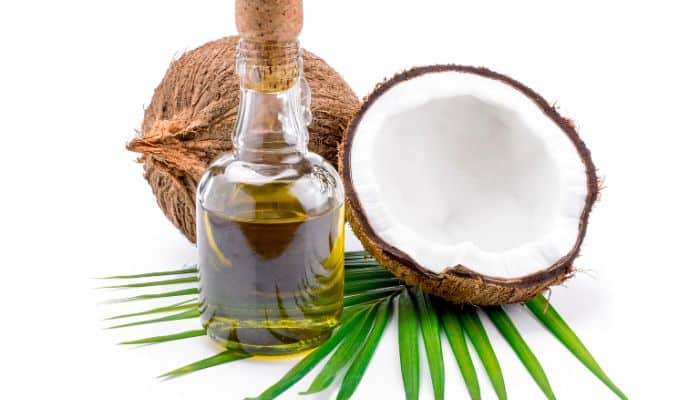Alternatives to Palm Oil and Why You Should Use Them
Palm oil is one of the worst oils for cholesterol health and the planet, contributing to deforestation, animal extinction and the displacement of indigenous people from their homes. You can do your heart — and the environment — a favor by switching to alternative, healthy cooking oils. Here are the best and worst options for your health.
The Worst Oils for Cholesterol Health
The main difference between the best and worst oils for your health is how much saturated fat they contain. That’s because excess saturated fat can raise your cholesterol. Most oils high in saturated fat are solid or semi-solid at room temperature, which can help you identify the worst oils for cholesterol management. They include:
1. Coconut Oil
Coconut oil is rich in saturated fat, mainly from lauric acid, so it’s best to avoid it if you’re watching your cholesterol levels. It’s one of the only plant-derived oils with very high saturated fat. At roughly 120 calories per tablespoon, coconut oil is also one of the highest-calorie foods on the planet, so enjoy it in moderation.
2. Butter
When comparing the best and worst oils for your health, remember that fats derived from animals typically have higher levels of saturated fat than plant oils. Butter is no exception. Eating butter can easily tip you past your daily limit for saturated fat and cholesterol, so avoid cooking with it if you’re watching your saturated fat intake.
3. Lard
Whereas butter is derived from milk, lard comes from meat. It’s simply another name for melted pork fat. Lard has much less saturated fat than butter, but still much more than you’d find in healthy cooking oils like olive or peanut oil.
4. Hard Margarine
The more solid a margarine container, the more saturated fat it contains, making it one of the worst oils for cholesterol maintenance. Margarine in stick form has the most saturated fat, while softer spreads have less. However, they still have more saturated fat than most plant-derived oils.
5. Ghee
Ghee is a type of clarified butter mainly composed of saturated fats. Interestingly, many people with lactose intolerance can eat ghee, although people with a true milk allergy should still avoid it.
6. Palm Oil
If you live in a Western country, odds are you eat palm oil every day. It’s found in everything from cookies to pizza. In fact, it’s also a common ingredient in shampoo, soap and makeup. Palm oil is one of the worst oils for cholesterol health because it can raise your low-density lipoprotein (LDL) levels, which can lead to plaque buildup in your arteries.
Healthy Cooking Oils to Incorporate Into Your Diet
Thankfully, you don’t have to give up fat altogether for a heart-healthy diet. Certain healthy cooking oils can be an essential part of maintaining your cholesterol and overall heart function.
1. Extra Virgin Olive Oil
Olive oil is well known for its health benefits. Extra virgin olive oil isn’t refined, making it better for you overall. Because olive oil has a low smoke point — the point at which it starts to break down — it’s best for low and medium-heat cooking rather than deep frying.
2. Cold-Pressed Canola Oil
It can be hard to find unprocessed canola oil in the U.S. Look for a “cold-pressed” label to signify that it is less refined and contains more nutrients. Canola oil is low in saturated fats and has a high smoke point, making it great for frying foods at high temperatures.
3. Peanut Oil
Peanut oil maintains its composition even at high heat and pairs well with everything from chicken to potatoes. It has a savory, nutty flavor and is low in saturated fats. It’s also a great source of vitamin E.
4. Avocado Oil
Avocado oil is one of the few plant-based oils not derived from seeds but from the fruit itself. It’s great for cooking, as it has olive oil’s smooth, light texture but a higher smoke point. It doesn’t have a strong flavor. Avocado oil is also rich in vitamin E and monounsaturated fats.
5. Sesame Oil
This oil is derived from sesame seeds and has a potent, savory taste that pairs well with Asian cuisine. Because of its high smoke point, you can cook it at high temperatures without sacrificing flavor or texture.
6. Sunflower Oil
Sunflower oil contains a lot of vitamin E, which helps maintain healthy skin and eyes, and omega-6 fatty acids, which are good for your heart. It has a high smoke point and mild flavor, so it’s great for frying foods. Sunflower oil might be hard to find in stores due to a global shortage.
7. Soybean Oil
Soybean oil is extracted from soybeans and is one of the most common cooking oils in the world. You can use it for frying, baking or as a salad dressing. It mostly consists of polyunsaturated fatty acids, which may have a beneficial effect on your blood pressure.
The Best and Worst Oils for Your Health
The main differences between the best and worst oils for your health are their saturated fat levels. Healthy cooking oils are typically low in saturated fat, while those that have higher levels can raise your bad cholesterol.
Although palm oil is prevalent in processed foods, it’s best to avoid it when possible and replace it with healthier alternatives. Your heart — and the planet — will thank you.



Comments are closed.